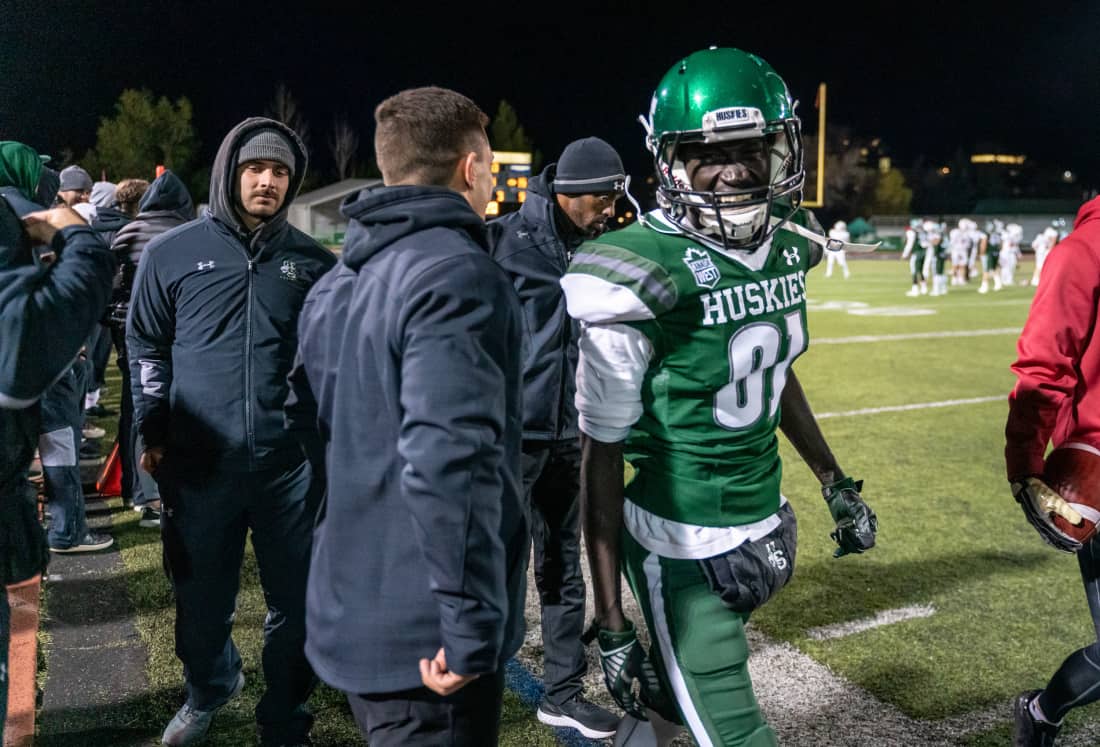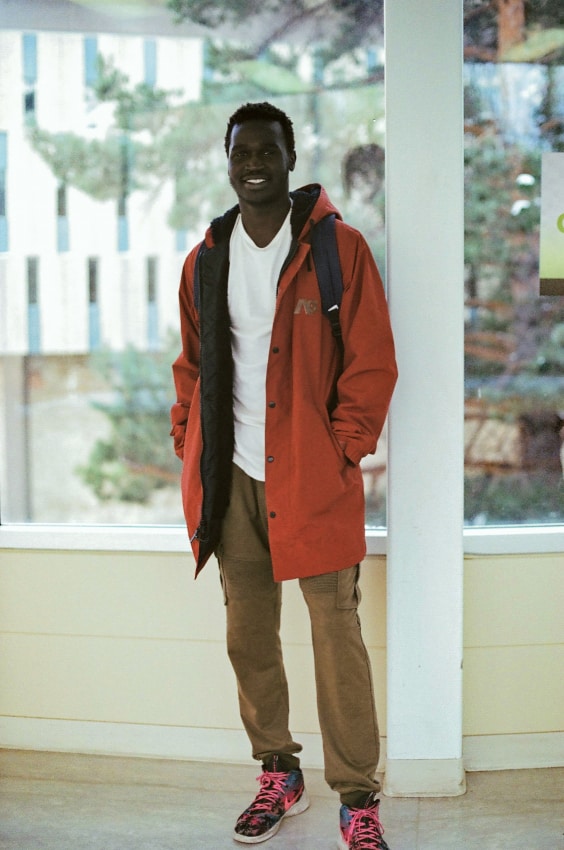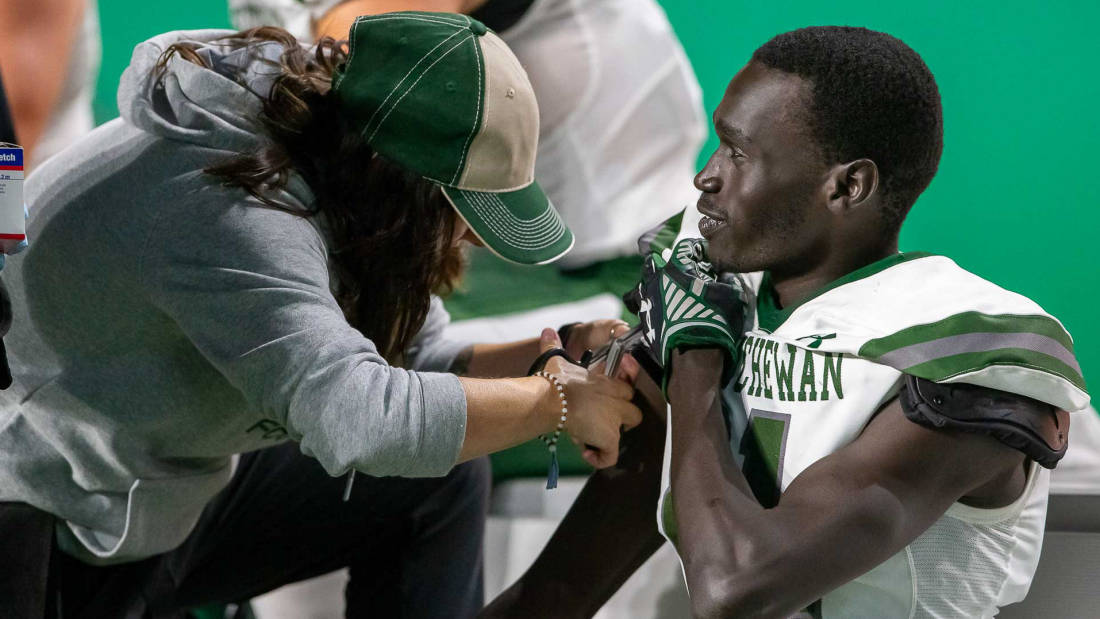
From the outside looking in, you would never guess the trials and tribulations that Yol Piok has been through.
As a first-generation immigrant from Sudan, his childhood in Regina is not what you would expect from a student athlete competing at the highest level of football in Canadian university sport.
“I remember vividly running out to [my brother] and seeing his face with blood everywhere. At four years old, you don’t really comprehend what’s going on,” Piok said.
Piok’s second-oldest brother was struck by a car right in front of their three-bedroom townhouse packed with nine family members, seven of them being under the age of 13. Piok said he does not know how his brother didn’t die — he thanks God that his brother survived the nearly fatal accident.
Without properly dealing with the trauma as a youth, Piok repressed the memory into the back of his brain, saying “The same thing happens with being broke and living in poverty, you don’t really notice it or process it,” Piok said.
Piok says there would be stretches of time growing up when he did not see his parents at all. His mother often worked three jobs, and if mom or dad were not at work, it was obvious that they were exhausted from trying to make ends meet.
“In grade seven or eight is when I started to notice how depressed I actually was,” Piok said, noting that while he was approaching high school, he always told his peers that he was “just tired all the time.”
In grade nine, Piok’s dad moved back home to Sudan to pursue better work opportunities, where the Pioks had emigrated from in 2000. During the time his father was 7,000 miles away, Piok’s older brother got into trouble with the law and was sentenced to five years in prison while Yok was in grade eight.
“It was crazy. At this point, I had to step up,” said Piok, who knew he needed to help out the family financially right away. He was one of the middle children, so he felt responsibility as an elder to his younger siblings.
Piok picked up part-time jobs to juggle on top of high school football practices during the week. He worked a paper route before finding a job at McDonald’s. Without access to a vehicle, he walked 45 minutes just to work an evening shift.
Growing up, Piok says that he and his siblings had to look out for each other and raise one another. Conditioned in this way of living, Piok did not realize how hard his life had actually been until he left home in Regina for the University of Saskatchewan.
Fortunately, during his junior and senior high school years, Piok was able to excel on the football field. Looking back, Piok struggles to explain this as he knows his depression was winning the battle on most days.
In grade 11, he was named to the 2013 Team Saskatchewan roster and was named an all-star in the Canada Cup during that year.
“It was pretty hype,” Piok said with a smile. His mom had forgone a mortgage payment to allow him to pursue this opportunity.
During his senior year, Piok felt the pressure to perform to the best of his abilities given his family’s investment into his passion. He says that he vomited before every game. “At the time, I thought it was just nerves. But now, I know that it was really bad anxiety,” Piok said.
Piok played well in grade 12. His offensive co-ordinator on Team Saskatchewan was also the recruiting co-ordinator for the Huskies during that time.

During a recruiting visit, the Huskies gave Piok the choice to pick a restaurant where they would meet and grab a bite together. He chose the burger and fries restaurant Five Guys because he had never been there and “in my mind, Five Guys is expensive,” Piok said.
Shortly after, Piok found out that a close friend, also being recruited by Saskatchewan, met with team officials at a steakhouse. “I didn’t know I had that kind of choice,” Piok said while laughing it off.
Piok felt that he could trust the Huskies from the first impression, believing that they were down to earth.
But the University of Alberta was also recruiting Piok. Following a visit to the Golden Bears campus, Piok stopped in Saskatoon to attend a Huskies football game.
“I was hooked. As soon as I saw them come out of the dog, I was like, ‘sign me up,’” Piok said, recognizing that the team atmosphere on the sideline was enough for him to make his decision.
His first year as a Huskie was spent red-shirting, meaning that he would not be on the team’s active roster, in turn, saving a year of playing eligibility to be used later on in his career as a more mature student athlete.
This allowed Piok to focus on physically preparing himself for his first year of Canada West competition for the following season. But like many naïve first-year university students, Piok ignored his mental health.
In 2015, Piok earned a spot on the team and injuries to veteran players catapulted him into a prominent role. In his very first start at wide receiver, Piok caught a touchdown.
After that season, Piok’s father had returned from Sudan. The decision to leave Canada while Piok was in grade nine had not worked out as the family had hoped.
“You never know with third-world countries. All of a sudden, boom, they break out in a civil war,” Piok said, referring to the Sudanese civil war that is still active today.
Just as his dad returned, Piok’s strenuous schedule as a student-athlete was wearing him down.
“You realize how financially hard it is to be a student athlete,” Piok said, noting that football players have to give the team sometimes up to 40 hours of their time each week.
“From August to November, you have that on top of four or five classes,” Piok said. “So you don’t really have an opportunity to work.”
The continuous cycle of football and classes had caused Piok’s mind to be all over the place. “I’m not complaining at all, but it caused that same personality hijacking where you don’t really feel like yourself or really want to do anything,” Piok said.
Piok says that his first three playing seasons — from 2015 to 2017 — all meshed together as one long year. He simply endured the grind without appreciating the moments in front of him.
In January 2018, Piok was struggling with finances. At this time, he was paying his landlord in cheques but he noticed that the cheques were not being cashed.
“So I had the bright idea to start [spending] my rent money,” Piok said, explaining that he would spend money intended for rent on other expenses.
More than two months later, this strategy blew up in Piok’s face. On April 5, 2018, his landlord texted him explaining that the cheques did not cash and he needed the rent money right away.
“I sat there thinking, ‘Well, I’m not doing any of this anymore,’” said Piok, who had already suffered through a lifetime of struggles, financial and otherwise, dating back to the first memories he had as a child.
I sat there thinking, ‘Well, I’m not doing any of this anymore.’
“Everything hit me at once,” Piok said, too ashamed to ask his mom for the outstanding rent money. Looking back, he realizes, “I have tons of friends I could have asked and they would have one thousand per cent helped me out… I feel like I put a price on my life at that point.”
“It was at the point where it was like, man, if football wasn’t bringing me joy, if school was not helping me, my life was pointless,” Piok said.
Like many others who reach their own personal breaking point, Piok reflects back on his journey and identifies many opportunities he had to pursue professional help.
“There were so many points where I’m like, I could’ve got help here, I could’ve got help there, could’ve done this there,” Piok said, explaining that while he was living his life in a consistent state of fear, he was not thinking straight.
That night on April 5, Piok attempted to take his own life.
Before attempting, Piok told himself that if he wakes up the next morning, there is obviously some reason that he is on this planet.
Miraculously, he woke up the next morning.
Huskies head coach Scott Flory was there for Piok while he admitted himself to the hospital the day following day of his attempt.
“All I could do was be there as a supportive figure and make sure he got the best help possible,” Flory said.
Piok tried to come back to football that season, but he was not feeling right while going through the first week of training camp and enough was enough. By the end of that week, he informed Flory that he needed to sit out for the season.
“He apologized to me, that was just ridiculous. Come on, what are you going to apologize for? There’s nothing that he ever needed to apologize for,” Flory said.
Flory said that the team held responsibility in Piok’s personal guilt, “I’m sorry we couldn’t help you more. I’m sorry we couldn’t discover this sooner.”
During this time, Piok was a team captain. Flory says there was no doubt that the Huskies were losing a great locker room presence and key contributor to the team, “but I wanted to make sure that he was okay and every decision was made with his best interest in mind.”
Piok says that it was hard to step away from the game that had become such a vital part of his identity.
That year in 2018, the Huskies captured the Canada West conference title, the Hardy Cup Championship, for the first since 2006.
“People always ask, ‘It must have been hard to watch them without you?’” Piok said, explaining that while the team won their battles on the field, Piok was simultaneously winning his battle off the field.
Piok did not want to be a distraction for his teammates during a season that he believed was promising for the team. He stepped aside so they could focus solely on football while he could focus on his goal of “making sure there’s a better me.”
Throughout this season, Flory would check in with Piok regularly.
“Actually looking him in the eye and saying, ‘How are you doing? Are you okay?’” Flory said, recognizing that with a locker room of around 90 student athletes, it is difficult to gauge the lives of each individual.
“A lot of times it is so superficial. It is hard for young men to be able to be vulnerable and put themselves out there,” Flory said.

After spending the year going through countless counselling sessions and re-establishing relationships with family and close friends, Piok felt ready to come back to training camp in preparation for the 2019 season.
Flory says he was very honest with Piok before the season, telling him that he had to earn the trust of everyone inside the Huskies’ locker room, “starting from ground zero.”
“He started from being a fifth-string wideout, he kept working, he didn’t complain, he did all the right things, his quality of play improved and he earned his spot as a starter,” Flory said.
After a year of hiatus, Piok climbed the depth chart to start for the team in their 2019 season opener.
“When he came back, he has been the most appreciative athlete that we’ve had,” Flory said. “Before every game, he gives each coach a hug and tells you that he loves you. It’s an unbelievable sense of gratitude and joy that he has.”
“As a coach, you can’t help but smile when you see and feel how much of an impact [football] has on his life,” Flory said.
When he came back, he has been the most appreciative athlete that we’ve had.
– Scott Flory, Head Coach
In the season opener on the road in Winnipeg, Piok did his usual pre-game routine of a hug with every coach. This time though, he forgot to hug Flory.
“Yol! Yol!” Piok says Flory yelled out to him, “You forgot to hug me!”
Piok could not believe he had forgotten to hug someone who had been there from his rock bottom.
“Man, I’ve worked my butt off to get to this point and this man has been there for every single step of it,” Piok said.
During the game, Piok caught a touchdown pass and fall to his knees, raising both hands towards the sky, “giving all glory to God.”
His teammates rushed to embrace him, many of whom aware of his mental battles off the field.
“It was the greatest feeling,” Piok said.
All the memories of his setbacks and road to recovery had opened the floodgates of emotion.
“Tears of joy are better than tears of sorrow.”
—
Tanner Michalenko/ Sports & Health Editor
Photos: Heywood Yu, Victoria Becker/ Photo Editor, Supplied by GetMyPhoto.ca/ Huskie Athletics
Leave a Reply